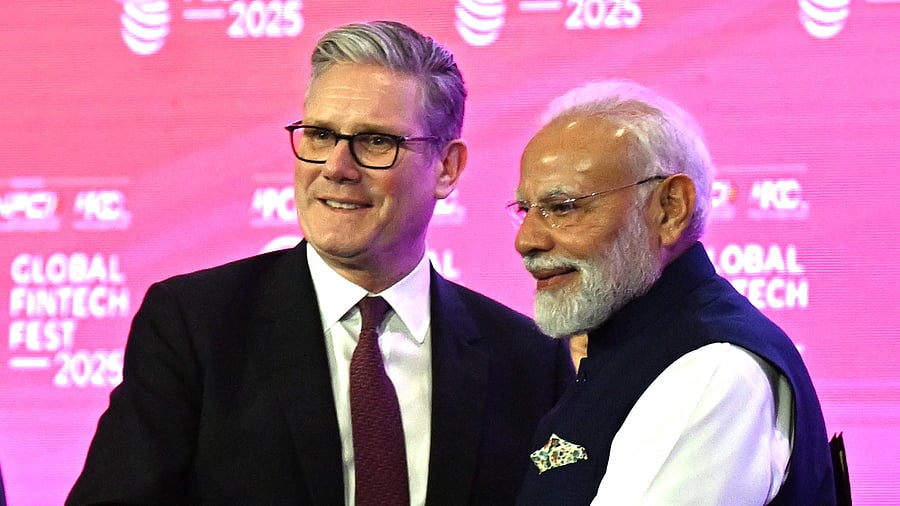
Keir Starmer (left) with PM Narendra Modi at Global Fintech Festival.
Credit: X/@narendramodi
Mumbai: After the highly-successful trade talks with British premier Keir Starmer in Mumbai, Prime Minister Narendra Modi announced India’s plans to double bilateral trade with United Kingdom by 2030 from the existing level of $56 billion even as he seemed to take a dig at United States President Donald Trump, albeit without naming him.
“Today our (Indo-UK) bilateral trade is of the order of $56 billion. We've set a target of doubling it by 2030. I'm confident we can achieve the target before that,” Modi said addressing the India-UK CEO Forum.
Modi, while addressing the sixth edition of Global Fintech Festival, shared how India was helping other countries in the development of digital technologies.
“We're also helping other countries to develop technologies besides sharing it….aur yeh digital aid nahi hai, verna duniya mein kai logo ko shouk hai ki weh aid de rahe hai….samajdar ko ishara kafi hai…for us this is not aid, but digital empowerment,” he said in what seemed to be a jibe aimed at Trump.
Underlining that India has democratised digital technology, making it accessible to every citizen and every region of the country, the Prime Minister highlighted that this has now become India’s model of good governance.
“India and the UK are natural partners. Our relationship is built on the shared values of democracy, freedom, and the rule of law. In today’s time of global uncertainty, our growing partnership stands as an important pillar of global stability and economic progress,” said Modi after talks with Starmer.
“India Stack is not merely a story of India’s success, but a beacon of hope for the world, especially for countries in the Global South”, the PM said, while emphasising that through its digital innovations, India aims to foster digital cooperation and digital partnerships globally.
Modi cited Modular Open-Source Identity Platform (MOSIP) developed in India, as a major example, noting that over twenty-five countries are adopting it to build their sovereign digital identity systems.
Modi said that digital payments have become routine in India, attributing this success to the JAM Trinity—Jan Dhan-Aadhaar-Mobile. Pointing out that UPI alone facilitates twenty billion transactions every month, with a transaction value exceeding twenty-five lakh crore rupees, Modi emphasized that out of every hundred real-time digital transactions globally, fifty occur in India alone.
India’s digital stack is being discussed globally, citing key components such as the Unified Payments Interface (UPI), Aadhaar Enabled Payment System, Bharat Bill Payment System, Bharat-QR, DigiLocker, DigiYatra, and the Government e-Marketplace (GeM) as the backbone of India’s digital economy, he said.
The Prime Minister expressed satisfaction that the India Stack is now giving rise to new open ecosystems.
“ONDC, which is Open Network for Digital Commerce, is proving to be a boon for small shopkeepers and MSMEs, enabling them to access markets across the country. OCEN, which stands for Open Credit Enablement Network, is simplifying access to credit for small entrepreneurs and addressing the issue of credit shortage for MSMEs,” he said.
The Prime Minister expressed confidence that the digital currency initiative being pursued by the RBI will further enhance outcomes.
Affirming that India has consistently supported the creation of a global framework for ethical AI, Modi stated that India’s experience with digital public infrastructure and its learning repository can be valuable for the world. He emphasized that the path India has followed in digital public infrastructure is the same approach it seeks to advance in AI. “For India, AI stands for All Inclusive”, added Modi.